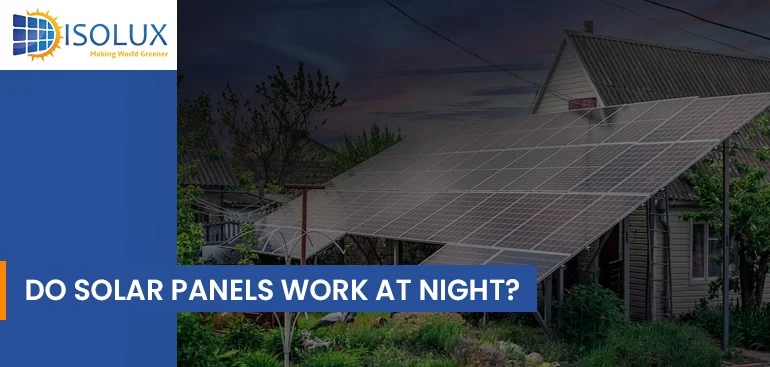Solar power has gained immense popularity as a clean and renewable energy source. Harnessing the power of the sun during the day seems like a straightforward concept, but a common question arises: do solar panels work at night? Let’s explore the intricacies of solar power generation and delve into the role of solar batteries in ensuring continuous electricity supply even after the sun sets.
How Does Solar Power Work at Night?
Solar power systems rely on the conversion of sunlight into electricity through the use of photovoltaic (PV) panels. During the day, sunlight energizes the panels, generating direct current (DC) electricity. This DC electricity is then converted into alternating current (AC) electricity by an inverter, making it suitable for powering household appliances and feeding into the grid.
However, solar panels do not generate electricity at night because there is no sunlight available. Therefore, an alternative solution is required to meet the energy demands during nighttime hours.
Are Solar Panels Operational During the Night?
No, solar panels do not work at night since they rely on sunlight to generate electricity. Without sunlight, the panels are unable to produce the required energy. This is where solar batteries come into play.
How Do Solar Batteries for Homes Operate?
Home solar batteries store excess electricity generated by solar panels during the day. These batteries store the energy in chemical form, typically using lithium-ion technology. When the sun sets and the solar panels stop producing electricity, the stored energy from the battery is used to power the home.
Solar batteries are connected to the main electrical panel of the house and can automatically switch to battery power when the grid goes down. This ensures a seamless transition to backup power, offering peace of mind and an uninterrupted energy supply.
Enhancing the Utilization of Solar Power
To maximize the use of solar power, it is essential to optimize consumption. This involves strategically using electrical appliances during daylight hours to utilize the energy generated by solar panels. By shifting energy-intensive tasks such as laundry or dishwashing to daytime, homeowners can minimize reliance on grid electricity.
Backup Power from Residential Solar Batteries
One of the significant advantages of having a solar battery system is the ability to have backup power during outages. When the grid goes down, a home with a solar battery can continue to operate critical appliances, such as refrigerators, lights, and communication devices.
Establishing your Backup Power System
Installing a backup power system with solar batteries requires professional expertise. An experienced technician can assess your energy needs and recommend the right battery capacity for your household. They will also ensure the proper installation and integration of the battery system with your existing solar panel system and other electrical setup.
Transitioning To Solar Backup Power
During an outage, the transition from grid power to backup solar power should be automatic and seamless. This is achieved through a device called a transfer switch, which detects when the grid power is unavailable and switches the home’s electrical load to the battery system. This uninterrupted transition ensures that essential appliances continue to function without interruption.
How Much Backup Power Can Be Obtained from a Solar Battery?
The backup power capacity of a solar battery depends on several factors, including the battery’s storage capacity, the energy demands of your home, and the duration of the outage. Homeowners can choose the battery capacity that suits their needs, ranging from smaller systems that provide essential backup power to larger systems that can sustain the entire home’s energy requirements for an extended period.
Can an Electric Vehicle Be Charged Using a Solar Battery?
Yes, solar batteries can be utilized to charge electric vehicles (EVs). By connecting an EV charger to the battery system, you can use solar energy stored in the battery to charge your vehicle. This not only reduces your dependence on the grid but also enables you to charge your EV with clean, renewable energy.
What is the Cost of Solar Batteries?
The cost of solar batteries varies depending on factors such as the brand, capacity, and additional features. While the initial investment may seem significant, it is essential to consider the long-term savings on electricity bills and the environmental benefits of using clean energy. It is highly recommended to obtain quotes from reputable solar installers in Sydney to get an accurate estimate quote tailored to your specific requirements.
Are Solar Batteries a Worthwhile Investment?
Solar batteries have become increasingly popular due to their ability to provide backup power, optimize energy consumption, and reduce reliance on the grid. While the upfront cost may be a consideration, the long-term benefits, including potential savings on electricity bills and reduced carbon emissions, make solar batteries a worthwhile investment for many homeowners.
What is the Typical lifespan of a solar battery?
The life expectancy of a solar battery depends on various factors, such as battery chemistry, usage patterns, and maintenance. On average, a well-maintained solar battery can last anywhere from 10 to 15 years. It is crucial to follow the manufacturer’s recommendations for proper maintenance and ensure the battery is installed and used correctly to maximize its lifespan.
Conclusion
Solar panels do not work at night since they rely on sunlight to generate electricity. However, with the integration of solar battery systems, homeowners can have access to backup power during nighttime hours and outages. Solar batteries store excess energy generated by solar panels during the day and provide a seamless transition to backup power when the sun sets. By optimizing energy consumption and utilizing solar batteries, homeowners can reduce their reliance on the grid, save on electricity bills, and contribute to a greener future.
Get the quote for a solar panel system with a battery from the top solar panel installer in Sydney.
Read Next Blog:
6.6kW, 9.9kW & 13.2kw Solar System: Comparison & Specifications




